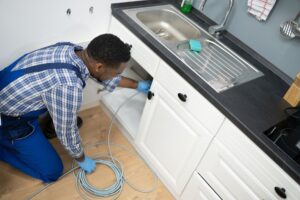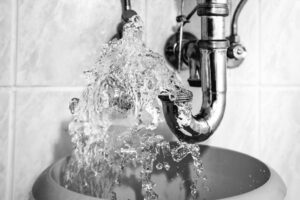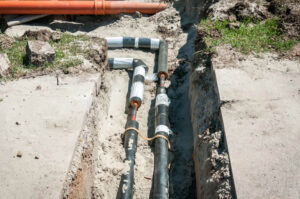Water Heater Lifespan and Life Expectancy
Like any other appliance, water heaters do not last forever. The average lifespan or life expectancy is about 8 to 12 years, although this may vary based the location and design of the unit, past maintenance on the unit, and the water quality in your area. Proper preventative maintenance can help extend the life of your water heater, but eventually something will go wrong. What problems can be easily repaired and when should you just buy a new water heater?
Water Heater Problems
Water heater installation service can have a variety of problems. Some are easy fixes you can do yourself while others are best left to a professional. Let’s look at some of the most common water heater problems.
Water heater runs out of hot water too easily
If you have a new water heater then the cause could simply be that the thermostat is set too low. The thermostat should be set for 120 degrees. This is hot enough to help keep bacteria from growing in your water heater but low enough to avoid scalding. If your thermostat is already set at 120 degrees and you used to get plenty of hot water from your tank water heater, and now you don’t, then it could be an electric heater element has burned out, a dirty gas burner, a build-up of sediment in the bottom of the tank, a faulty temperature sensor or faulty thermostat.
Most electric tank-type water heaters have two heating elements: one near the bottom and one further up. If one goes out, the remaining heater cannot keep up with the demand. Excessive sediment in your water heater tank can reduce its efficiency. You should flush your water heater at least annually.
Running out of hot water quickly.
If you run out of hot water when someone is taking a shower and you are also running the dishwasher and washing machine, you may simply be over taxing the water heater. This is often the case of a tank-less water heater. Just turn off the appliances and the tankless water heater temperature for your shower should quickly warm back up. With a tank water heater, it is going to take 15-20 minutes for the water to get warm.
No hot water
A typical cause includes a circuit breaker for your electric water heater has tripped. Turn the breaker completely off then back on again. If it trips off again (it may not trip immediately), it could be a faulty breaker, or a heating element has shorted out.
If you have already been experiencing a shortage of hot water for some time (indicating one of the elements has already gone out), then the other heating element may have finally gone out. Other causes could be a faulty temperature sensor, or thermostat gas control valve.
Gas pilot light has gone out
Sometimes a sudden puff of air can blow out the pilot light. Relight the pilot light. (Read your owner’s manual on how to do this.) If it won’t relight or won’t stay lit, you could have a problem with a pilot light sensor, the pilot light burner needs cleaning or replacing, or you have a problem with the thermostat. WARNING! Make sure to air out the area of your gas water heater before attempting to relight the pilot light. If you still smell the typical rotten egg or onion odor and it doesn’t go away, do not light a flame. Shut off your gas valve to the water heater and call your plumber. Some gas water heaters have an electric spark ignitor, which can become dirty or burn out.
Hot water smells bad
If the cold water smells bad, too, then the problem is likely not the water heater. The cure could be as simple as an additive to the salt bring tank on your water softener or adding a charcoal filter to your water line. Or it may require replacing old metal plumbing pipes. Rather than guessing your way through various water filters, that may or may not work, give your plumber a call. He probably knows the reason for smelly water in your area and knows what it will take to cure it.
If only your hot water smells bad, it could be bacteria buildup in your water heater. There are ways of disinfecting your water heater, but they are usually just a very temporary cure. Sometimes changing the type of anode in your water heater will help. Whether or not you have a water softener can be a factor. You are best off to contact your plumber to determine what is causing the odor and then take the proper action.
Water heater is making gurgling, grumbling noises
Usually, this is due to excess sediment in the bottom of the tank, especially in gas water heaters. In a gas water heater, the water is heated from the bottom and starts to boil. Air bubbles are trapped under the sentiment and build up until they break through the sediment and make bubbling noises. You may be able to cure this by simply flushing the sediment out. Be sure to read your owner’s manual. There is a right way and wrong way to do this. In an electric water heater, you can easily burn out your electric heaters by not following the proper sequence of flushing your water heater. If in doubt, call your plumber.
Water heater is leaking
This could be due to the pressure relief valve leaking, a water inlet or outlet leaking, the drain valve leaking, or corrosion of the hot water tank. All but corrosion of the water tank can usually be fixed.
Fix or Buy New?
Whether or not your water heater is worth fixing depends on its age and what you can do yourself. With proper preventive maintenance, tank water heaters typically last 8-12 years and tank-less heaters can last 20 or more years.
Flushing your heater tank is easy and costs virtually nothing. If you have not flushed it for years, or you have hard water, you may not be able to flush all of the sediment out. Flushing a tankless water heater is more complicated, but something some can do themselves.
Relighting the pilot light is easy. Be sure to read the owner’s manual. If you can’t find your manual, you might be able to download it from the manufacture’s website. If the pilot light won’t light or won‘t stay lit, then you a more involved problem that may require removing the pilot light gas tube for cleaning or replacing, or may require replacing the thermostat.
Replacing an electric heater element is not very difficult nor very expensive. You need a multi-meter (which you can buy for less than $20), a little bit of electrical know-how, and a large socket wrench, and plumbers tape. You drain the tank, turn off the electrical breakers, remove some wires, unscrew the faulty heating element, and screw in the new one and hook things back up. There are two elements. You use the multi-meter to determine which one is bad.
Leaking inlet or outlet pipes: If you have plumbing experience, you are all set. If not, call your plumber.
Leaking pressure relief valve: This is not a difficult fix. Just requires a large socket wrench and strong arm. Just make sure it’s really the valve and not cracks in the tank around the valve causing the leak. Also, make sure to replace it with an equivalent valve.
Call gas line repair for Cleaning or replacing the burner in a gas water heater: It involves disconnecting wires, removing a cover plate, and making sure you have the burner properly aligned when you replace it.
If your water heater is old, this is a good time to shop for a new one. If you are not sure the problem is the thermostat gas control valve, call your plumber. He may discover the problem is something much less expensive to fix.
Tankless water heaters require different servicing techniques.
If your water heater is old, and you have to call a plumber to fix the pipes, this may be a good time to just go ahead and get a new water heater.
With two decades of experience, Cole’s Plumbing is professionally qualified to repair or replace your water heater – tank or tankless. We have the right equipment, tools, and experience to do the job right – at an affordable price. Call/text us at (972) 210-9033 or complete the Get an Estimate form with your water heater questions.







